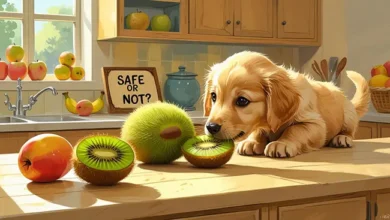
Tortillas are a quick source of energy for people, thanks to their carbs, fiber, and minerals like iron and calcium. Flour tortillas, especially the fortified ones, and whole-grain corn tortillas both have their benefits. A medium flour tortilla usually has about 140 calories and can be high in sodium. Corn tortillas are lighter on calories and have more fiber, which is good for digestion and your heart. Since many people do not get enough fiber, corn tortillas can be a smart choice, especially when you add veggies and lean protein.
But what about your dog? Can dogs eat tortillas? Is it safe for them to eat tortillas? The short answer is to be careful. Before you share any tortilla with your pet, it is best to read up on the facts and risks. While a plain piece is not usually toxic, things like added salt, oils, and big portions can upset your dog’s stomach or lead to weight gain. Fried tortilla chips are even worse because they are extra salty and fatty, which can cause more problems for dogs.
Make sure to read this whole article before giving your dog any tortilla. I will walk you through the main health facts, common mistakes, and when you should call your vet. You will also find a simple comparison of corn and flour tortillas, sodium content, and how much is safe for pets.
What Are Tortillas Made Of?
Tortillas are simple flatbreads made from just a few basic ingredients. Corn tortillas typically contain masa harina (ground nixtamalized corn), warm water, and a small amount of salt. Flour tortillas are made with all-purpose flour, warm water, oil or butter, baking powder, and salt. Some variations include combinations of corn and wheat flour for added texture and flavor.
Nutritional Content from a Dog’s Perspective
From a dog’s dietary perspective, tortillas are primarily high-carbohydrate foods with minimal nutritional value. While corn provides some protein, carbohydrates, and antioxidants, and whole wheat offers complex carbohydrates and dietary fiber, these benefits are limited for dogs. The fiber content in whole-grain tortillas can aid digestion, but dogs don’t process grains as efficiently as humans do. Most tortillas also contain moderate amounts of salt, which should be limited in a dog’s diet.
Can Dogs Eat Tortillas? The Basic Answer
Plain tortillas are not toxic to dogs, but aren’t particularly healthy either. Dogs can safely consume small amounts of plain tortillas occasionally, but they offer little nutritional benefit and are essentially empty calories. Both corn and flour tortillas fall into this category – safe in moderation but not recommended as regular treats.
Occasional Small Amounts May Be Okay
A small bite now and then won’t harm most dogs, provided the tortillas are plain and unflavored. However, pet owners should be cautious about portion sizes and frequency. Tortillas should only be offered as an occasional treat, not as a regular part of a dog’s diet. Always avoid flavored tortillas that may contain toxic ingredients, such as onion or garlic powder, and monitor your dog for any adverse reactions when introducing new foods.
6 Surprising Health Facts About Dogs Eating Tortillas
Many dog owners consider sharing a piece of tortilla with their pet, but there are several important health considerations to keep in mind. Here are six key facts about dogs and tortillas that highlight why this food is not an ideal treat.
1.Tortillas Pack More Calories Than You’d Expect
Tortillas are dogs. A single flour may contain 150-300 calories, which is a large portion of a mall dog’s daily caloric requirements. A large number of tortillas can lead to excess caloric requirements. Regular consumption of tortillas can lead to excess calorie intake and increase the risk of obesity. Overweight dogs are more likely to develop health problems such as diabetes, heart disease, and joint issues. Treats should make up no more than 10% of a dog’s daily calories, so even occasional tortilla consumption can disrupt a balanced diet, which is harmful to dogs. Dogs process salt very differently from humans, and excessive sodium intake can lead to dehydration, especially if they don’t have constant access to fresh water. In severe cases, too much salt can cause sodium poisoning, resulting in symptoms like vomiting, diarrhea, tremors, and even seizures. The salt content in tortillas varies significantly between brands, but even “low-sodium” versions often contain more salt than what’s healthy for canine consumption.
3.Dangerous Seasonings Lurk in Flavored Varieties
Flavored tortillas may contain ingredients that are toxic to dogs or can cause health issues. In small amounts, these seasonings can be harmful. Even small amounts of these seasonings can be harmful, especially for smaller dogs. It is important to check ingredient labels, as some tortillas labeled as plain may still contain added preservatives and additives that are unsafe for pets, with canine health in mind. These chemical preservatives can cause digestive upset and may accumulate in your dog’s system over time. Some preservatives commonly found in commercial tortillas have been linked to allergic reactions and skin sensitivities in dogs with sensitive skin. Homemade tortillas are generally safer than commercial varieties, but they still don’t provide nutritional benefits that justify the risks.
5.Gluten Intolerance Affects Some Dogs
Flour tortillas contain gluten, which can trigger allergic reactions or intolerance symptoms in dogs that are sensitive to it. While grain allergies in dogs are relatively uncommon, they can cause uncomfortable symptoms, including diarrhea, vomiting, skin irritation, itching, and recurring ear infections. Dogs with gluten sensitivity may also develop hotspots, chronic digestive issues, and weight loss. If your dog shows any of these symptoms after eating tortillas or other grain-based foods, consult your veterinarian about potential food allergies.
6.Tortillas Offer Zero Nutritional Benefits
The main thing to remember is that tortillas don’t give your dog any useful nutrition. Unlike fruits or veggies, tortillas are just empty calories and don’t help your dog’s health. Dogs do best with good protein, healthy fats, and the right vitamins and minerals. Giving tortillas just adds carbs your dog doesn’t need.
Common Risks of Feeding Tortillas to Dogs
It might feel harmless to give your dog a piece of tortilla, but these flatbreads can actually cause health problems for dogs. Knowing about these risks helps you keep your pet safe and still enjoy time together.
Digestive Upset and Gastrointestinal Issues
The most immediate concern when dogs eat tortillas is digestive upset. Many dogs experience stomach problems after consuming tortillas due to their high carbohydrate content and processed ingredients. Common digestive issues include:
- Diarrhea and loose stools – The high-carb content can overwhelm your dog’s digestive system
- Vomiting – Especially if your dog eats too much too quickly
- Excessive gas and bloating – Carbohydrates can ferment in the gut, causing uncomfortable gas buildup
- Abdominal pain – Dogs may show signs of discomfort by pacing, whining, or reluctance to move
If your dog has these symptoms, they usually show up a few hours after eating tortillas and can last a day or two, depending on how much your dog ate.
Food Allergies and Intolerances
Some dogs are allergic to ingredients in tortillas, like wheat or corn. Grain allergies are not very common, but they can make your dog uncomfortable if they happen.
Wheat and gluten sensitivity can trigger symptoms like:
- Chronic itching and scratching, especially around the face and ears
- Skin rashes, hot spots, and flaky, dry skin
- Hair loss from excessive scratching
- Recurring ear infections with dark, smelly discharge
- Obsessive paw licking and chewing.
Corn allergies are even less common, but they can still cause skin problems and stomach issues. If your dog already has food sensitivities, they are more likely to react to tortillas.
Weight Gain and Obesity Risks
Tortillas are surprisingly high in calories despite their thin appearance. A single flour tortilla can contain 80-100 calories, which represents a significant portion of a small dog’s daily caloric needs. Regular tortilla consumption can quickly lead to:
- Rapid weight gain – Extra calories from treats like tortillas add up quickly.
- Increased risk of obesity – Dogs weighing 20% above their ideal weight are considered obese.
- Associated health problems – including diabetes, heart disease, joint problems, and reduced lifespan
The high carbohydrate content in tortillas provides little nutritional value while contributing empty calories that can disrupt your dog’s balanced diet.
Toxicity Concerns
Store-bought tortillas often contain significant amounts of salt, which can be dangerous for dogs. Unlike humans, dogs have a much lower tolerance for sodium, and excessive salt intake can lead to serious health complications.
Salt poisoning symptoms include:
- Excessive thirst and urination
- Vomiting and diarrhea
- Lethargy and weakness
- Loss of coordination
- Tremors or seizures in severe cases
Even a little bit of salty tortilla can cause trouble, especially for small dogs or dogs with kidney or heart problems.
Dangerous Seasonings and Additives
Some tortillas have seasonings, preservatives, or flavors that are bad for dogs. Watch out for these common harmful ingredients:
- Garlic and onion powder are both toxic to dogs and can cause anemia.
- Artificial preservatives – Can cause allergic reactions or digestive upset.
- Spices like chili powder can irritate your dog’s mouth, throat, and stomach.
- Xylitol (artificial sweetener) – Extremely toxic to dogs and can cause life-threatening hypoglycemia.
Flavored tortillas, like spinach, tomato, or herb kinds, are even riskier because they can have several things that are not safe for dogs.
Signs to Watch For After Your Dog Eats Tortillas
If your dog eats tortillas, especially a lot at once, watch them closely for these signs:
- Vomiting and diarrhea – The high carbohydrate content can upset their stomach
- Gas and bloating – Tortillas can cause excessive flatulence and abdominal discomfort.
- Excessive thirst – High sodium content in many tortillas leads to increased water consumption
- Lethargy or unusual tiredness – Your dog may seem less energetic than normal
Allergic Reactions
Some dogs may experience allergic reactions, particularly if they’re sensitive to gluten or other ingredients:
- Skin irritation or hotspots – Itching and redness on the skin
- Recurring ear infections – A sign of food sensitivities
- Weight loss or appetite changes – Less common but possible with food allergies
Toxic Ingredient Warning Signs
Seasoned or flavored tortillas pose greater risks due to harmful ingredients like garlic, onion, or excessive spices:
- Weakness and pale gums – Signs of anemia from garlic or onion toxicity
- Difficulty breathing or rapid heart rate – More severe toxic reactions
- Loss of coordination – Advanced symptoms requiring immediate attention
When to Consult Your Veterinarian
Call Immediately If You Notice:
- Persistent vomiting that prevents keeping water down
- Severe lethargy or inability to stand normally
- Signs of dehydration, like dry gums or loss of skin elasticity
- Any symptoms of toxicity from seasoned tortillas containing garlic or onions
Monitor Closely For:
- Changes in bathroom habits lasting more than 24 hours
- Loss of appetite for more than one day
- Unusual behavior or discomfort
Most dogs are okay if they eat a small amount of plain tortilla, but eating a lot can upset their stomach. Keep your vet’s number nearby and call if you are worried about your dog’s health. It is always better to be safe.
Safe Alternatives to Tortillas for Dogs
Tortillas are not poisonous to dogs, but they do not give much nutrition and can upset some dogs’ stomachs. Here are some healthier treats your dog will love:
Fresh Fruits and Vegetables
Try these natural, crunchy treats that are good for your dog:
- Apple slices (remove seeds) – Rich in fiber and vitamin C
- Blueberries – Loaded with antioxidants for immune support
- Banana chunks – Great source of potassium and natural sweetness
- Carrots – Perfect for dental health and beta-carotene
- Green beans – Low-calorie and full of vitamins K and C
- Sweet potato – Packed with vitamins A and fiber
Lean Protein Treats
Most dogs love meat-based snacks:
- Plain cooked chicken – High-quality protein without seasoning
- Turkey pieces – Lean protein that’s easy to digest
- Small fish portions – Omega-3 fatty acids for shiny coats
- Unsalted cashews – Occasional treat with healthy fats (just a few at a time)
Commercial Dog Treats
Pick dog treats that are made with simple, natural ingredients. Avoid treats with lots of salt or artificial preservatives.
The Whole Prey Diet Advantage
If you want to give your dog a very balanced diet, you can try the Whole Prey diet. This means feeding your dog things like muscle meat, organs, and bones from animals such as quail, rabbit, or chicken. This way, your dog gets all the vitamins and minerals they need in a natural form.
Treats should only be about 10% of your dog’s daily food. These healthier options will help keep your dog happy and healthy, without the extra carbs from tortillas.
Expert Tips on Feeding Human Food to Dogs
It is normal to want to share food with your dog, but you need to be careful. Some human foods are safe for dogs if given the right way, but others can be harmful. It is important to know which foods are good and how to give them safely.
Safe Human Foods for Your Dog
Lean Proteins
Cooked chicken, turkey, and beef are good treats for dogs if you prepare them right. Take out all bones, skin, and extra fat before giving them to your dog. Fish like salmon are also healthy, but make sure there are no bones. Fully cooked eggs are another protein treat many dogs like.
Fresh Vegetables and Fruits
Vegetables such as carrots, green beans, and broccoli give your dog vitamins and fiber. It is best to cook or steam most vegetables so your dog can digest them easily. Safe fruits are apples (without seeds), bananas, and blueberries. These are better than processed dog treats.
The Golden Rules of Sharing
Moderation is Everything
Human food should be no more than 10% of what your dog eats each day. Use these foods as treats, not as meals. Even healthy foods can cause weight gain or problems if your dog eats too much.
Keep It Plain and Simple
- Avoid seasoned, processed, or flavored foods.
- Skip salt, garlic, onions, and artificial sweeteners.
- Choose fresh, whole ingredients over packaged items.
- Prepare foods without oils, butter, or spices.
Foods to Avoid Completely
Never give your dog chocolate, grapes, raisins, onions, garlic, or anything containing xylitol. These foods can be toxic and potentially life-threatening. When in doubt, stick to your dog’s regular food or consult your veterinarian for guidance.
Every dog is different, so add new foods slowly and watch for any stomach problems. Your dog’s regular food should be their main diet, and human foods should just be special treats.
The Bottom Line on Tortillas
Plain tortillas are okay for dogs in small amounts, but they are not a good choice. Give them only as a rare treat, just 1 or 2 small pieces a week. Tortillas do not usually hurt your dog, but they have empty calories and lots of carbs that can cause weight gain.
Prioritize a Balanced Diet
A healthy diet with the right foods is what keeps dogs happy and strong. Every meal should have good protein, healthy fats, and important nutrients. When you want to give a treat, pick dog-friendly foods like carrots or apple slices instead of foods high in carbs.
Talk to Your Vet
If you have questions about what your dog should eat, your vet is the best person to ask. They can give you advice that fits your dog’s needs. Making good choices now helps your dog stay healthy and happy in the future.
FAQ
Can dogs eat tortillas safely?
Dogs can eat small pieces of plain tortillas, but they are not healthy. Tortillas have little nutrition and may upset your dog’s stomach. It’s better to keep them as an occasional treat and not a regular part of your dog’s diet.
Are corn tortillas better than flour tortillas for dogs?
Corn tortillas are safer than flour tortillas for dogs because they are easier to digest. Still, both should be given in moderation. Too many can cause weight gain or stomach issues. Fresh, plain corn tortillas are always a better choice than processed ones.
Can tortillas make dogs sick?
Yes, tortillas can make dogs sick if eaten in large amounts. They may cause bloating, gas, or diarrhea. Some tortillas also contain oils, salt, or preservatives that upset your dog’s stomach. Always give only a small, plain piece if you share.
Are tortilla chips safe for dogs?
No, tortilla chips are not safe for dogs. They are high in salt, oil, and sometimes flavored with spices that can harm your dog. Eating chips may lead to dehydration, stomach upset, or long-term health issues. Stick to plain, healthy dog treats instead.
What are healthier alternatives to tortillas for dogs?
Healthier alternatives include plain rice cakes, small pieces of cooked sweet potato, or fresh vegetables like carrots and cucumbers. These are low in fat, safe for dogs, and provide more nutrients than tortillas. Always introduce new foods slowly to avoid stomach upset.


